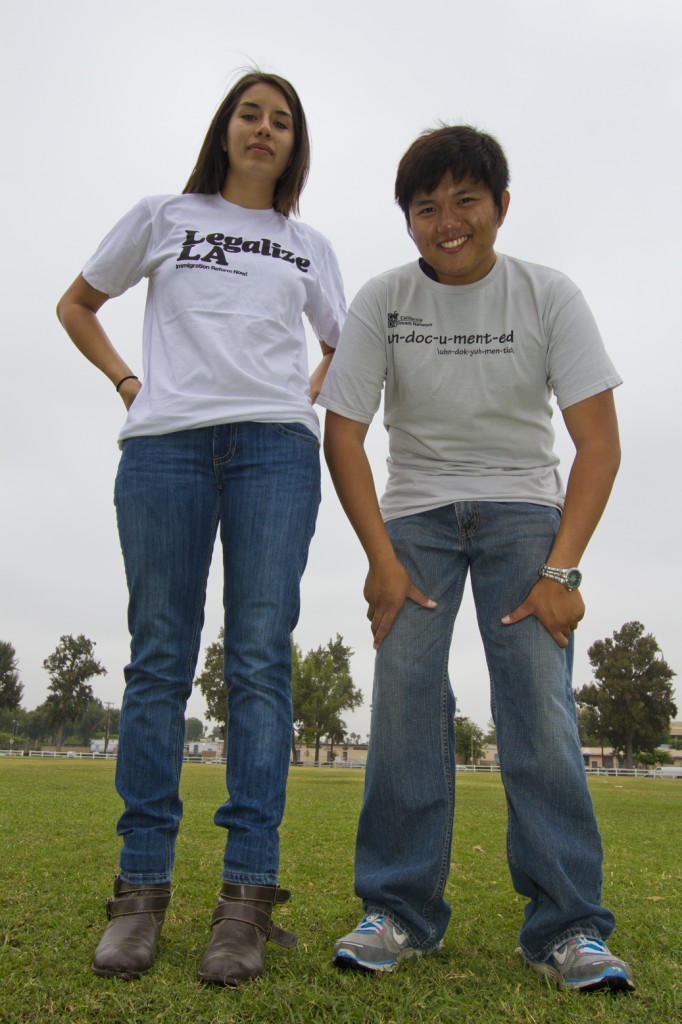Regemralph Corpuz isn’t ashamed anymore.
After years of living in constant fear of being discovered and eventually deported, the undocumented immigrant now uses his citizenship – or lack thereof – as a way to fight for the rights of students in the same situation.
Corpuz, in addition to holding the title of communications officer for the Student Senate for California Community College Colleges (SSCC), is also a former Associated Students Organization (ASO) senator and a two-time dean’s list student.
Though he is now relatively open about his immigration status, the political science major and Pierce College sophomore, who, like most undocumented immigrants, takes offense to the term “illegal alien,” remembers a time when he was just like most undocumented students: embarrassed and apologetic.
One incident in particular still, to this very day, manages to get to him.
He was attending a financial aid workshop as a high school student when he asked the lecturer what his chances were of getting any sort of financial assistance.
“The teacher yells out to the entire class, ‘No undocumented students can apply for [financial aid],’” said Corpuz, recalling the mortification he felt at the time.
He has since learned to accept – embrace even – the label he sports as an undocumented student.
“I was in UC Berkeley, and I saw how [other undocumented students] were so confident,” he said. “Even in high school, a lot of them just came out and talked about it like it was nothing. I thought to myself, ‘These guys aren’t scared, so why should I be?’”
Corpuz, who came to the United States through legal means, gained his current undocumented status 12 years ago after his family’s lawyers lost their legalization papers.
“The lawyers messed up, lost our papers, and couldn’t retrieve it,” Corpuz said. “It’s a common story.”
Corpuz is one of the thousands of undocumented students who would greatly benefit from the passage of the second half of the California Development, Relief and Education of Alien Minors (DREAM) Act of 2011.
The California DREAM Act, first proposed by Assemblyman Gil Cedillo in 2006, is a two-part legislative package that would grant qualified undocumented students access to financial aid.
Eligibility criteria for the DREAM Act includes: high school attendance of at least three full academic years, a high school diploma or General Educational Development (GED), and enrollment in an accredited institution of public higher education in the state.
The first part of the bill, better known as Assembly Bill (AB) 130, allows qualified undocumented students to acquire privately-funded scholarships; it was passed and signed into law by Gov. Jerry Brown July 25 of this year.
The second part of the bill, AB 131, is currently awaiting approval of the governor after being passed by the state Assembly on Sept. 2. This section of the bill gives undocumented students who meet the aforementioned criteria access to state-funded financial aid like Cal Grants.
The DREAM Act will not go into effect until July 1, 2012.
“[The passage of AB 131] is a great impact for students,” said Corpuz. “It alleviates some of the burden that comes with focusing on paying for college. Students will be able to focus more on their academics.”
Corpuz notes that the California DREAM Act is merely the beginning of improvement in the treatment of undocumented students.
“Even if the DREAM Act passes, it’s going to be a very long time before it’s implemented,” he said. “This is a tough time for all of us, especially because of the budget cuts; we’re being pushed farther away from pursuing an education.”
Pierce Counselor Sergio Belloso, the faculty advisor of campus club We Bringing Unity to Immigrants and Life to their Dreams (We B.U.I.L.D.), agrees with Corpuz.
“It’s a big step, but it’s nowhere near where we want it to be,” he said. “It doesn’t take away from the discrimination or legalization.”
In conjunction with his role as a self-proclaimed activist for additional rights for undocumented youth, Corpuz is an active member of We B.U.I.L.D.
In addition to advocating the California DREAM Act, We B.U.I.L.D. aims to assist undocumented students in terms of academic support, according to Corpuz.
“We want to offer tutoring to members so that they won’t get behind on their school work while they’re helping with the club,” he said. “Also, if you’re [an active member] and you’re affected by the economic downturn, we want to make sure that your school supplies are covered.”
The club plans on eventually raising enough money to create their own scholarship.
Fellow club member Estefania Pulido, who is a 19-year-old psychology major on her third semester at Pierce, feels just as strongly about equal education rights for undocumented immigrants.
“A lot of people haven’t made it to where I am, and it’s not because they don’t want to or because they don’t work hard for it,” Pulido said. “It’s because of the circumstances.”
Pulido, who is both a full-time student and worker, considers herself “pretty lucky,” because despite her difficulty in paying for her education, she has a job and people to help her out.
“Everybody has struggles they have to go through, so we’re not trying to make ourselves the victims,” she said. “We’re not victims; we’re just trying to move forward.”
With an issue as controversial as allotting resources contributed by citizens to those who are undocumented, Corpuz knows that he’s bound to have people disagreeing with his stance.
“We all worked hard for this,” he said. “We’re paying taxes while there are a lot of corporations that don’t even [pay their] taxes.”
Pulido agrees.
“There’s so much we can do for the country. There’s so much we can contribute,” she said. “We should at least be given the chance to prove ourselves.”
Links:
http://www.californiaDREAMact.org/
http://educationadvocacy.files.wordpress.com/2011/05/dream-act-fact-sheet-ab-130.pdf
